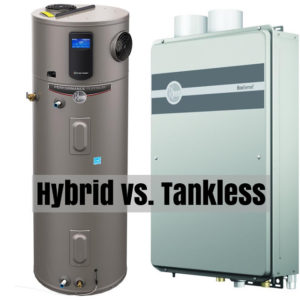Introduction
Over the past decade, tankless hot water heaters have been the go-to choice for energy-conscious consumers. However, the recent rise of hybrid hot water heaters, which blend heat pump technology with traditional tank benefits, is reshaping consumer preferences. Especially in warmer, humid climates, hybrid models are gaining a reputation for superior performance. Let’s delve into the advantages of each type to guide your decision-making process.

Tankless Hot Water Heaters
Tankless systems heat water directly without the use of a storage tank. When a hot water tap is turned on, cold water travels through a pipe into the unit, where a gas burner or an electric element heats the water. Because they heat water only when needed, they are generally more energy-efficient than traditional storage tank water heaters.
Key Benefits
- Energy Savings: By heating water on demand, tankless heaters prevent the energy losses associated with maintaining a tank of hot water.
- Space Efficiency: Compact in size, tankless units are perfect for homes with limited space.
- Endless Hot Water: Provides a continuous supply of hot water, ideal for families needing ample hot water during peak times.
- Durability: Longer operational lifespan than tank models, reducing replacement frequency.
- Reduced Water Damage Risk: No storage tank means a lower risk of leaks and related water damage.
- Lower Maintenance: Fewer maintenance requirements compared to traditional tank heaters.
Hybrid Heat Pump Hot Water Heaters
Hybrid models, also known as heat pump water heaters, combine heat pump technology with traditional electric resistance heaters. They use ambient air temperature to heat water, making them incredibly efficient in the right environments. Leading manufacturers include American Water Heaters, Bradford White, Rheem, and AO Smith.
Key Benefits
- Exceptional Efficiency: Can be two to three times more energy-efficient than traditional electric water heaters.
- Cost-Effective Operation: Operate at a fraction of the cost of conventional heaters—potentially saving hundreds annually on electric bills.
- Climate Friendly: Ideal for warm and humid settings where they can also cool and dehumidify the space—perfect for garages or basements.
- Large Capacity: Equipped with larger tanks capable of meeting high water demands.
- Smart Features: Often come with Wi-Fi connectivity for remote management, vacation modes to save energy, and leak detection systems for added security.
Comparative Energy Costs
In warmer climates, hybrid hot water heaters usually present lower annual operating costs compared to tankless models due to their high efficiency. However, in cooler climates, tankless water heaters remain a strong contender because they don’t rely on ambient air temperature to heat the water.
Choosing the Right Water Heater
The choice between hybrid and tankless water heaters largely depends on your living environment and personal preferences. Consider the following factors:
Installation Space
- Hybrid Heaters: Require more space and specific climate conditions to operate efficiently. They are larger units that need adequate room for airflow.
- Tankless Heaters: Compact and can be installed in smaller spaces, even mounted on walls.
Initial Investment vs. Long-Term Savings
- Hybrid Heaters: Generally cost more upfront but may offer greater savings over time due to lower operating costs.
- Tankless Heaters: Lower initial cost compared to hybrids, but savings may vary based on usage patterns and energy costs.
Water Usage Needs
- High Demand: For homes with high simultaneous water usage, tankless systems may struggle to keep up without multiple units.
- Consistent Supply: Hybrid heaters with large tanks can supply hot water to multiple fixtures simultaneously without a drop in temperature.
Conclusion
Both hybrid and tankless hot water heaters offer significant benefits, but the best choice depends on your specific needs and environmental conditions. Hybrid models excel in warm, humid climates and offer exceptional energy efficiency, while tankless models provide endless hot water and save space.
For residents of Palm Beach, Martin, or St. Lucie County in Florida, Water Heating Experts can help you navigate these options. As a top-rated, licensed (License number CFC1426133), and insured installer, we ensure that your installation is seamless and tailored to your requirements.
Contact Us for Expert Guidance
Ready to choose the most efficient and cost-effective hot water solution for your home? Contact Water Heating Experts at 561-602-9062 for a consultation. Our experienced team will help you determine whether a hybrid or tankless water heater is the best fit for your needs.
Your comfort is our priority. Trust the experts at Water Heating Experts to keep your hot water flowing efficiently.


Here is FPL's take on Hybrid vs. Tankless
https://www.fpl.com/business/save/energy-answers.html?cid=smb0317L3